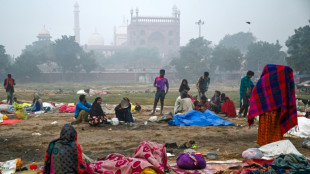

Breathless Indonesians irate over pollution crisis
Soaring pollution in Indonesia's capital has left 35-year-old Asep Muizudin Muhamad Darmini hooked up to breathing tubes at a Jakarta hospital, gazing at the dense grey haze outside.
Air pollution is hardly a new phenomenon in the megalopolis, but monitors and activists say the effects have been even worse than usual this year.
Under growing pressure, the government is beginning to recognise the contribution of industry to the soupy smog over the capital.
It sanctioned 13 firms in recent weeks for failing to meet operational standards and has since ordered remote work for some civil servants, cloud seeding, and vehicle emissions tests.
Before a regional summit last week, it even trimmed power generation at the Suralaya coal plant near Jakarta in a bid to tackle high levels of PM2.5, a class of pollutants which can penetrate deep into the lungs.
Still, the city of around 30 million people had the worst air pollution in the world for multiple days last month, according to Swiss-based monitor IQAir.
Darmini tried to shield himself by wearing a mask and exercising regularly, but in vain.
"I feel powerless because no matter how hard I try to maintain a positive mindset and live normally, my body cannot fight against the pollution," Darmini, 35, told AFP.
- Legal action -
The director of Indonesia's top hospital for respiratory diseases said infections and pneumonia cases spiked "20 to 30 percent" between March and July compared to last year, though he could not say definitively whether pollution was entirely to blame.
Air pollution is driven by multiple causes, with factors like warmer air, wind patterns, and topography playing a role in where pollutants concentrate.
Experts are also clear that polluting sources of energy like the coal power plants that dot Indonesia play a key role.
Data modelling by the Centre for Research on Energy and Clean Air (CREA) suggests emissions from the country's coal-fired power plants in 2022 were responsible for 10,500 deaths and $7.4 billion in health costs.
Indonesia has pledged to stop commissioning new plants from 2023 and to be carbon neutral by 2050.
But it is already facing legal action over its slow progress and the resulting impacts on the health of Indonesians.
In 2021, activists and citizens won a lawsuit that found President Joko Widodo and top officials negligent in protecting Jakartans from pollution.
The government lost its appeal but has filed another one to the Supreme Court.
- Lifelong problems -
Cempaka Asriani blames poor air quality for the persistent cough her six-year-old son cannot shake.
"The government doesn't appear to fully comprehend our rights and their obligations," the 35-year-old told AFP.
"My feeling goes beyond anger. I am so disappointed that I feel hopeless."
Children are among the most vulnerable to air pollution as their bodies are still developing, and early exposure can have lasting impacts.
"If children frequently contract respiratory infections, their lung growth could be impaired. This may lead to lifelong health problems," said Feni Fitriani Taufik, a lung specialist at Persahabatan Hospital.
With criticism growing, and having himself reported a cough, Widodo insisted a new sky train inaugurated in the capital last month would soon help.
The entire capital is due to move next year to the newly constructed city of Nusantara, on Borneo island, a shift also intended to alleviate pollution.
Widodo has also appointed a pollution taskforce, though it is headed by a top minister who is reportedly a shareholder in a company with coal-mining interests.
Luhut Pandjaitan, the minister, has hit back against criticism from developed countries of Indonesia's ongoing coal reliance, accusing them of hypocrisy.
And despite its climate goals, loopholes in Indonesia's commitments mean it could continue to build new coal-fired power plants that are already in planning or that power factories.
That could see air pollution emissions rise a further 70 percent by 2030 according to CREA.
Asriani and Darmini say their votes in next February's presidential election will be dependent on whether candidates have a plan to tackle pollution, with no frontrunner yet laying out their strategy for a shift towards cleaner energy.
"This is a systemic problem," Darmini said.
"I do not want us to reach a point where we have to buy clean air in the future."
A.García--ESF




